
Corporate Accountability’s international team of organizers and experts is on the ground at the U.N. climate talks in Bonn, Germany, June 17 – 27, 2019.
We’re standing shoulder to shoulder with our climate justice allies from around the world to challenge the Big Polluters stymieing progress and the Global North governments doing their bidding. And together, we’re organizing to advance the just solutions to address the climate crisis laid out in the People’s Demands for Climate Justice–to build a future where all people can survive and thrive.
Check back here, as well as our Facebook, Twitter, LinkedIn, and Instagram pages, for regular updates from the climate talks in Bonn.
Bonn wrap-up: Shifting the levers of power toward climate justice
28 June, 2019
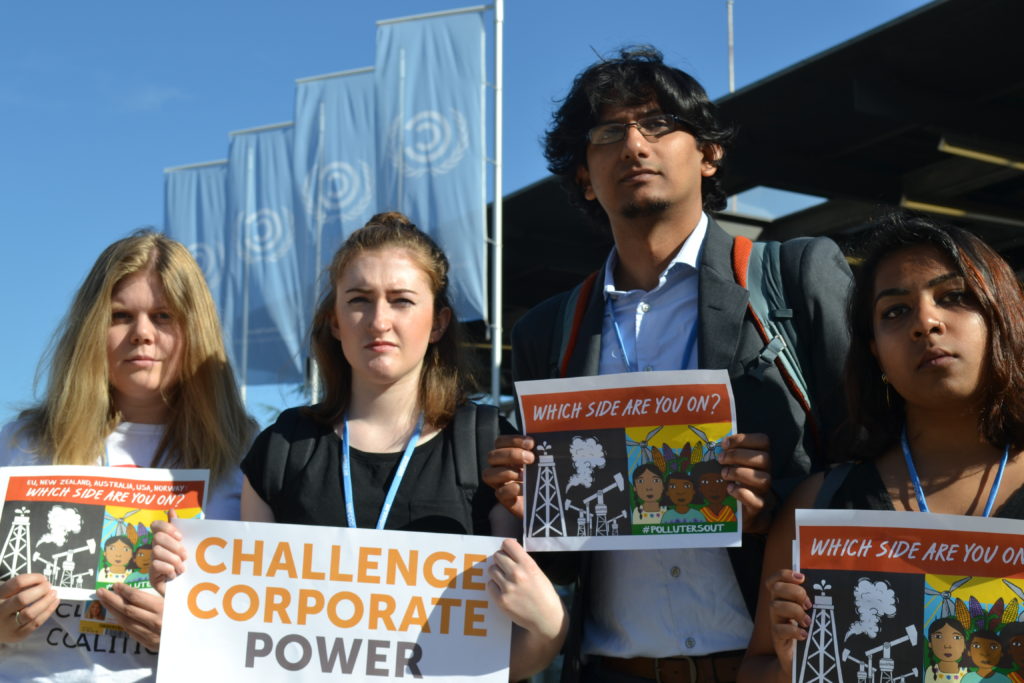
Sarah Dobson (UKYCC), Eilidh Robb (UKYCC), Sriram Madhusoodanan (Corporate Accountability), Aneesa Khan (Sustain US) at the Bonn climate meetings.
The U.N. climate talks wrapped up late last night in the plenary hall of the World Conference Center in Bonn, Germany.
Between the lines of technical text, diplomatic speeches, and plodding discussion, the global power dynamics between Global North and Global South—and between Big Polluters and people power—came into sharp focus over the last two weeks.
And so did the ways that we—the global climate justice community—are shifting those dynamics.
Here are three things to know about the outcomes of the Bonn climate talks:
1. The climate justice movement took a step forward toward bold, visionary climate solutions like those laid out in the People’s Demands for Climate Justice.
Governments from countries most affected by the climate crisis rejected obstructionist governments’ and Big Polluters’ push to make implementation of Article 6 of the Paris Agreement— the critical section on global collaboration to decrease emissions—focus solely on industry-driven market-based schemes. In Article 6 negotiating halls, governments from countries on the front lines of climate change pushed for things like ending fossil fuel subsidies, financing renewable energy technology, and more.
This is exactly what the global climate justice community intended when we all came together to launch the People’s Demands last year: to provide a true roadmap for governments to finally reject industry schemes and enter negotiating halls with concrete, bold, and just solutions. It’s a huge sign of progress to see them beginning to take hold.
And that wasn’t the only place where the power of the movement to kick Big Polluters out and advance climate justice was palpable at these talks….
2. The climate justice movement further exposed the U.S. government and left it standing on its own as a shill for polluters as it blocked a conflict-of-interest policy.
Going into these talks, we and our allies knew that, to advance a conflict-of-interest policy that could begin to kick Big Polluters out, we’d need to expose and challenge the U.S. government and its allies’ obstruction. So, with our partners in Bonn and around the world, we organized escalating actions through social media, video, email action, phone calls, and press conferences demanding Global North governments like the EU, Norway, Australia, and New Zealand side with people, not polluters and the U.S. government.
Over a series of five meetings, Global North governments, led by the U.S. and Australia, attempted to end debate on conflicts of interest… even as delegates representing nearly 50 countries called for such a policy. As the movement’s collective power grew over the week inside and outside the halls of the UNFCCC, the U.S. was increasingly alone in its shameless fronting for Big Polluter interests.
Nevertheless, the U.S. in the end used intimidation, distraction, and dirty tricks to block a conflict-of-interest policy from moving forward —for now. This doesn’t stop this issue from being placed back on the agenda next year. So you can be sure it’s not over.
3. The climate justice community is united in calling for governments to advance just, ambitious climate policy through the U.N. climate talks—and will not give up.
As news outlets around the world are reporting, the pace of progress at the U.N. climate talks fails to match the urgency of the climate crisis. The U.S. and Australia refused to address Big Polluters’ conflicting interests. A small handful of governments attempted to downplay the latest climate science. Global North governments dragged their feet on providing funding for loss and damage to countries most affected by the crisis—a top priority for Global South countries and the climate justice community.
Make no mistake: All of these represent serious injustice.
But we are determined to keep organizing for justice. Because we see the progress we can have on critical issues like Article 6. And because, as our partner Nathan Thanki of The Global Campaign to Demand Climate Justice said, speaking at the closing press conference organized by members of the climate justice community: “You can’t have a tug-of-war without a rope. This is an arena that we have a fight in.”
His words are a potent reminder that social change simply isn’t linear. The popular myth is that seismic change comes by bouncing from victory to victory in an ever-growing crescendo of inevitable progress. But the truth is, it looks more like a game of tug-of-war: a few steps forward, a few steps back.
The climate justice movement is adding more power and more players to our side of the rope, while the U.S., other obstructionist governments, and Big Polluters stand more and more alone.
As we look toward COP25 in Chile this December, we know we’ll have a big fight ahead of us. Finalizing the Article 6 guidelines is shaping up to be THE big topic on the agenda there, and it’s a top priority for Big Polluters to make sure their profits are protected. But we can already see how the global climate justice movement, powered by people like you all over the world, is shifting some pretty entrenched power dynamics.
We’re ready. Governments on the front lines of climate change are ready. The climate justice community is ready. And our ranks are only growing.
In fact, we’re on stronger footing than ever before to secure just, visionary climate solutions that work for people, not polluters.
Thank you for being a part of this movement, and for all you do to build a just future for all.
The Bonn talks may be over, but you can keep up with our climate campaign on our blog, Facebook, Twitter, and Instagram.
One little article; a multitude of just solutions for the climate crisis
26 June, 2019
The call to kick Big Polluters out has been ringing inside the climate negotiations in Bonn, outside the talks, and on social media. But it’s not the only pressing issue governments are grappling with here at the climate treaty talks.
In our first post in this series, we wrote about a critical part of the Paris Agreement called Article 6. Over the past week, negotiations around Article 6 have proceeded steadily.
From a climate justice perspective, the outcomes of these negotiations should help countries on the front lines of climate change access the technology, knowledge, solutions, and finance they need to respond and adapt to climate change.
From Big Polluters’ perspective, they should rubber stamp ineffectual carbon trading schemes that trample community rights and destroy the environment while lining corporate coffers.
The good news is that, for the first time, we’re seeing governments bring big ideas into the Article 6 negotiating room about what it could look like to advance the real, just solutions that millions of people all over the world need.
Why should you care about Article 6 right now?
This section of the Paris Agreement is about ways that governments can collaborate to address climate change—or at least, that’s what it’s meant to be about.
For years, obstructionist governments siding with Big Polluters have attempted to use Article 6 to advance one thing above all: market-based schemes like carbon trading systems—which have failed time and again to reduce carbon emissions, but allow polluters to keep extracting, burning, and profiting from fossil fuels.
At the last round of climate talks in Poland in December, governments were supposed to finalize what are called the “guidelines for implementation” of the Paris Agreement… in other words, the concrete set of steps that turn the accord’s words on paper into action. They did so—finalizing guidelines for all sections except for Article 6.
If you’re scratching your head and thinking, “Wait—international cooperation to address the climate crisis: isn’t that the whole point of the Paris Agreement?” …you’re not alone. This section is critical to the strength of the agreement over all.
That’s exactly why the discussions on Article 6 have been so contentious—and why all eyes are on it now. It’s why Big Polluters are determined to make sure this section is a vehicle for protecting their own interests. And it’s why we absolutely must harness its potential to advance real, just climate solutions that can actually protect people’s lives and our planet.
Advancing just climate solutions to save people’s lives—not industry profits
In Poland last year, governments essentially granted themselves a one-year extension: to finalize the guidelines on Article 6 by the next round of climate talks (COP25), in Chile this December. Here in Bonn, they’re continuing to negotiate what those guidelines look like.
Which brings us back to the good news: More governments than ever before are speaking up about the need to focus on real, just solutions in these guidelines—not simply market-based schemes. Some of those potential solutions include:
- Support for ending fossil fuel subsidies.
- Financing for renewable energy technologies.
- Steps to reduce corporate capture of policy implementation (read: kicking Big Polluters out!).
- And more….
That’s where Corporate Accountability and our allies come in. As we raise the visibility of this issue outside the talks (hey, thanks for reading!), we’re also seizing every opportunity to demonstrate that there are many paths forward—not just the schemes industry pushes.
Say it one more time: Article 6 really matters
As a handful of prominent climate justice leaders wrote last year, if Big Polluters have their way, the Article 6 guidelines will create “an official space for polluters to continue polluting unregulated.”
Of industry-driven market measures, they write: “Such schemes are criticized for being rooted in the colonialism and environmental racism that is at the core of fossil fuel extraction. Indigenous peoples, small-scale farmers, forest peoples, youth, communities of colour and women are most impacted by these schemes.”
As you read about what’s happening at these talks—and as your eyes begin to glaze over—don’t for a moment forget that between the lines of diplomatic language and stuffy legalese, people’s lives are being traded and negotiated.
The deals that are made here, and the language that is adopted, become official international policy. Those policies are adopted by governments all over the world, and directly impact our global response to the climate crisis at every level—from the local, to the national, to the international.
That’s why we have to support the bold governments championing just climate policy in these talks. And it’s why we have to kick Big Polluters, and the self-serving schemes they peddle, out of the negotiating halls.
If you haven’t yet, take action today to demand the EU side with people, not polluters, at the climate talks. And stay tuned for more updates here.
What on earth is going on in the negotiations for a conflict-of-interest policy?
24 June, 2019
Here’s the scoop: Over the weekend, and continuing today, obstructionist governments doing Big Polluters’ bidding have been ramping up their efforts to end any discussion of industry conflicts of interest—for good.
These governments, like the U.S., EU, Australia, and Norway, have been disregarding the clear, united calls from the climate justice community inside the talks as well as the voices of people like you from all over the world on the outside calling to kick Big Polluters out.
Today at #SB50Bonn, the UN climate negotiations, young people took to the streets to DEMAND climate justice now.
That starts with #PollutersOut and #PeopleIn
pic.twitter.com/Qivo7J1TKo
— UKYCC (@ukycc) June 21, 2019
The good news is that governments from countries on the front lines of climate change have been standing firm against this relentless obstruction.
The Least Developed Countries (LDCs), a bloc of governments that negotiate shared positions at the climate talks, know how much is at stake. They know Big Polluters are fueling a crisis that is already taking a toll on their people’s lives and livelihoods. And they know Big Polluters must not write the rules any longer.
So on Saturday, after obstructionist governments one by one took the microphone to try to take up space to avoid talking about a conflict-of-interest policy, a representative from the LDCs spoke out. In no uncertain terms, he demanded governments address the issue. And the LDCs continued to hold the line through negotiations today—even as we know Global North governments are ramping up pressure behind the scenes.
We need to show the LDCs that people around the world are with them in solidarity. And, just as importantly, we need to make sure the obstructionist Global North governments—like the EU—get the message.
That’s why we and our allies need you to make a call to the EU’s offices in Washington, DC today and first thing tomorrow.
The EU likes to play good cop to the U.S.’ bad cop in these negotiations—but they can only get away with it if no one is paying attention. Raise your voice with us—and stay tuned for more updates here.
Week 2 in Bonn: Looking ahead
23 June, 2019
As we wrote last week, the two items at the U.N. climate talks in Bonn that Corporate Accountability is following most closely are the call for a conflict-of-interest policy (the first step toward addressing Big Polluters’ interference in climate policymaking), and the discussions on finalizing guidelines for a section of the Paris Agreement called Article 6, which deals with international collaboration on addressing the climate crisis.
Negotiations around a conflict-of-interest policy heated up last week (scroll down for more), and those conversations will continue. Meanwhile, we expect Article 6 negotiations to rise in prominence this coming week as well.
If you’re interested in getting into the weeds on Article 6, what it’s really about, and why the climate justice community is calling for real, just solutions to address climate change over industry-driven market-based schemes, check out this blog post by our ally Souparna Lahiri of Global Forest Coalition.
And for more on what our other partners across the climate justice movement are organizing and calling for here in Bonn, check out this ongoing blog series from the Global Campaign to Demand Climate Justice.
As always, check back here for updates from the ground, including urgent actions you can take to support the movement for real, just solutions to address the climate crisis. Thank you for all you do!
Governments have yet to discuss Big Polluters’ role in climate talks — but civil society wastes no time
20 June, 2019
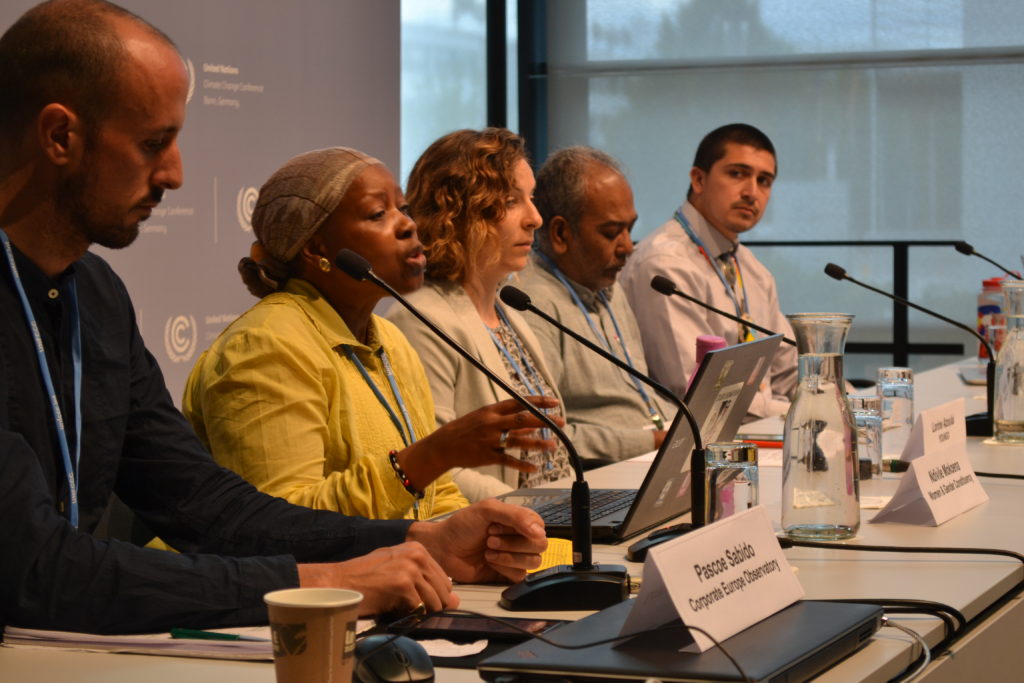
Left to right: Pascoe Sabido, Corporate Europe Observatory, moderates a press conference on Big Polluters and conflicts of interests featuring Ndivile Mokoena representing the Women & Gender constituency; Lorine Azoulai, Youth constituency; Souparna Lahiri, Demand Climate Justice; and Michael Charles, Indigenous Peoples’ Caucus and member of the Navajo Nation.
At the global climate talks in Bonn, Big Polluters’ conflicting interests have yet to come up in the sessions where it’s on the agenda. But people from across civil society groups and constituencies are making sure the topic stays front and center.
But first, to understand where things are at, follow us into the weeds for just a brief moment of treaty context: Under the UNFCCC (global climate treaty), there are multiple types of discussion that may be happening at the same time—like trains running on parallel tracks.
The issue of industry conflicts of interest is addressed as part of the agenda of a track called Arrangements for Intergovernmental Meetings (AIM). This is where governments discuss the nitty-gritty of how meetings are run: things like rules and processes for meetings, timing and host countries for major convenings, budgets… and “engagement of non-Party stakeholders”: i.e., who besides governments gets to participate and how.
As you can imagine, there are a number of items on the agenda besides the issue of whether and how Big Polluters should have a seat at the table. So yesterday, in the first meeting of AIM, the topic didn’t come up.
But people across civil society are determined that when this issue comes later this week, the demand is loud and clear. That’s why, today, we and our allies organized a press conference to show government delegates and the media alike that the issue of Big Polluters’ and their proxies’ conflicting interests cuts across many other priority issues for the climate justice movement… and must swiftly be addressed.
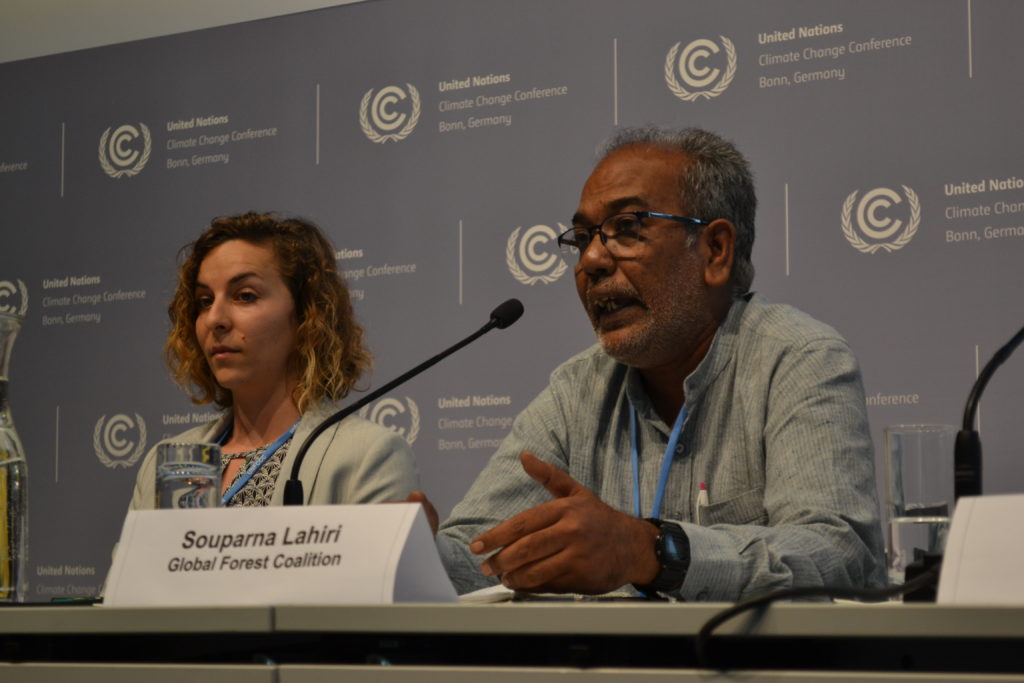
Souparna Lahiri of Global Forest Coalition calls to kick Big Polluters out of the U.N. climate talks at this morning’s press conference.
Each of the panelists represented a different constituency with a different focus area within the talks… but all had a common, clear message: It’s time to kick Big Polluters out of the climate talks.
They carried that message into the second session of AIM this afternoon. And although again the topic of industry conflicts of interest didn’t come up for governments, they allocated a portion of the meeting to hearing from civil society groups.
One by one, our allies took the floor: First the Climate Justice Network, then the Indigenous Peoples’ Organization, then the Youth constituency, and finally the Women & Gender constituency. And one by one, they made clear to the governments of the world gathered in the room that—regardless of whatever else is discussed in AIM sessions—kicking Big Polluters out is a big priority.
Michael Charles, a youth leader with SustainUS, is a member of the Navajo Nation. He spoke out forcefully on behalf of the Indigenous Peoples’ Organization, representing the voices of different indigenous communities all over the world.
“Industry representatives were welcomed from the beginning at the UNFCCC while indigenous peoples have always had to fight for our voices to be heard within these halls of negotiation. Therefore, not only are we in support of a conflict-of-interest policy, but also call for the enhanced participation of Indigenous Peoples in climate policy. We reiterate that Indigenous Peoples are self-determining Nations that must be recognized by the UNFCCC as such. Our participation at the table should be prioritized and our indigenous rights should not be lost at the stake of the influence of industry representatives.”
Michael’s words lay bare the real, devastating consequences that Big Polluters’ interference in the talks has — not just on arcane international policy, but for people’s lives all over the globe.
In taking up space at the table to advance their own profit-driven agenda, polluters and their proxies crowd out the voices of communities most impacted by the climate crisis—and the true, just solutions these communities have been bringing forward for years.
Just chaired a v.inspiring press conference – speakers representing youth, indigenous peoples, women and gender and climate justice groups described the devastating impact of corporations on their work, and all called for a #ConflictsOfInterest policy. EU are you listening? pic.twitter.com/8p5GBeq2KG
— Pascoe Sabido (@pascoesabido) June 20, 2019
After today, governments that seek to delay progress on this issue are on notice: Civil society is united, and we expect delegates to address polluters’ and their proxies’ conflicting interests at these negotiations.
We need you to help amplify the demands of these and the many other people and organizations calling to kick Big Polluters out of the climate talks. Take action now to demand Global North governments stop doing polluters’ bidding—and start supporting a conflict-of-interest policy, so that just solutions to the climate crisis can take hold.
Watch: What’s going on at the global climate talks?
19 June, 2019
Today is a big day at the climate talks in Bonn: This afternoon, governments will have the opportunity to discuss the topic of conflicts of interest for the first time this session — and Global North governments and Big Polluters have already amped up pressure to try to shut it down.
We need to turn up the heat to show the world is watching — and to be in solidarity with the Global South governments standing up for climate justice inside the negotiating halls.
Watch this short video we produced with our allies, then share it widely on Facebook and Twitter to help spread the word. Together, we can kick Big Polluters out and finally begin advancing true, just solutions to the climate crisis.
#PollutersOut demands take center stage as Bonn climate talks begin
17 June, 2019
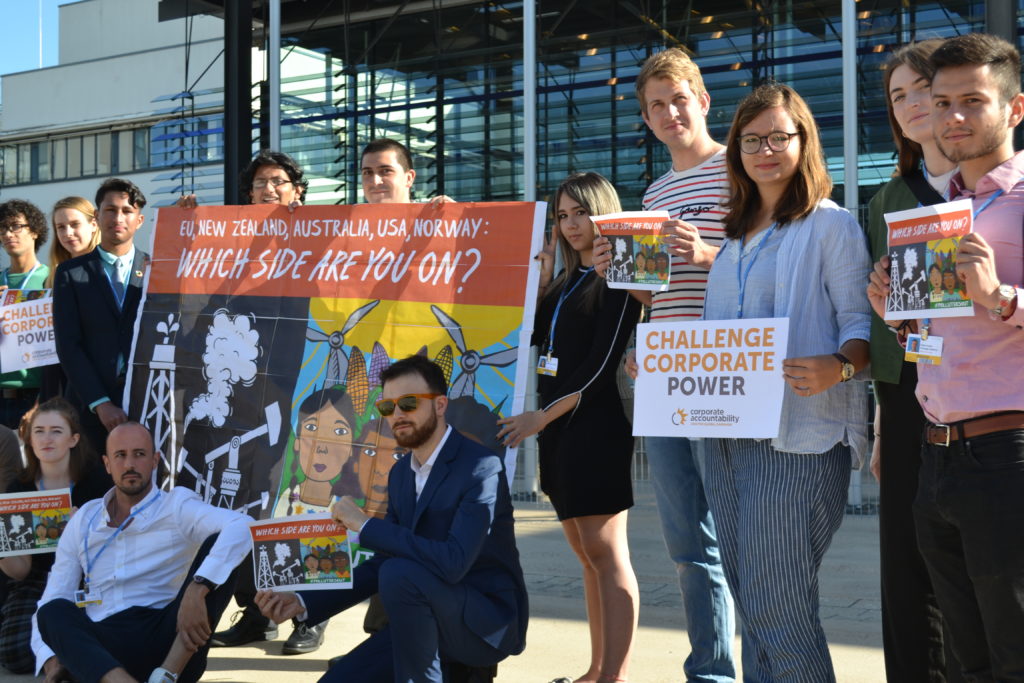
As the climate talks began on Monday morning, activists had a clear message for Global North governments blocking climate justice: #PollutersOut!
This morning, as the U.N. climate talks began in Bonn, the call to kick Big Polluters out of climate policy was front and center—literally.
We were there bright and early to greet government delegates, the media, and other attendees as they arrived at the conference hall for the start of negotiations.
Together with allies from around the world, we led an action calling on Global North governments like the U.S., EU, Australia, New Zealand, and Norway to stop doing the fossil fuel industry’s bidding — and to side with the hundreds of thousands of people like you and hundreds of organizations from around the world calling to kick Big Polluters out. The action came on the heels of Friday’s social media day of action, where hundreds of posts reached more than 2 million people around the world echoing the urgency of kicking #PollutersOut.
We expect the topic of a conflict-of-interest policy will be taken up later this week on the agenda of the negotiations. That means we don’t have a moment to waste to show governments the widespread support for such a policy, which could protect against Big Polluters’ interference.
So, after the action, we headed into the conference center, where we hand-delivered a letter, signed by 300 organizations, to the office of the EU delegation.
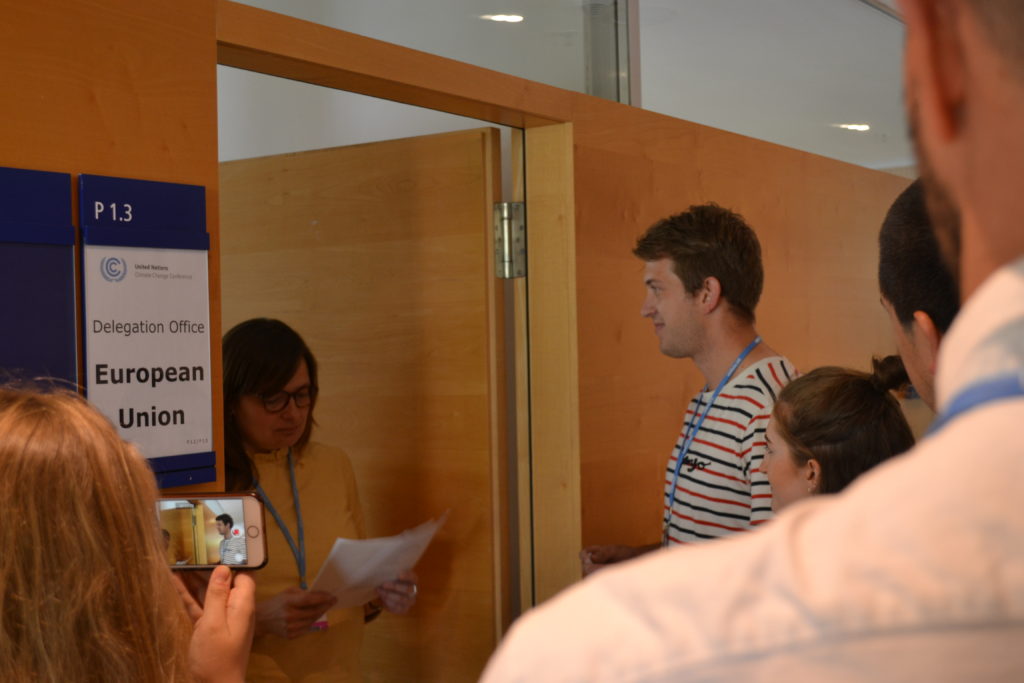
With Michael Bloss, a newly elected member of the European Parliament (MEP), we and our partners hand deliver a letter signed by 300 organizations from around the globe calling on the EU to side with people, not polluters. He reminded the EU delegation that EU Parliament has voted to direct the EU delegation to support a conflict-of-interest policy, and that he and other members of parliament are eager to see the delegation finally do so at these talks.
Our request for the EU to support a conflict-of-interest policy to protect the treaty from Big Polluters was met with typical diplomatic talking points—but confirmed that the EU is very much paying attention.
We rounded out the morning with two press conferences to help set the tone for the negotiations among governments, civil society, and the media alike.
First, Deputy Campaigns Director Sriram Madhusoodanan spoke on a panel hosted by our friends at Demand Climate Justice, highlighting Big Polluters and conflicts of interest as a key topic to watch.
Then, we held a press event specifically on conflicts of interest, featuring our allies at SustainUS, UK Youth Climate Coalition, Global Forest Coalition, and a member of European Parliament. Each shared their perspective on how the fossil fuel industry’s overwhelming presence at the talks undermines true solutions for climate justice.
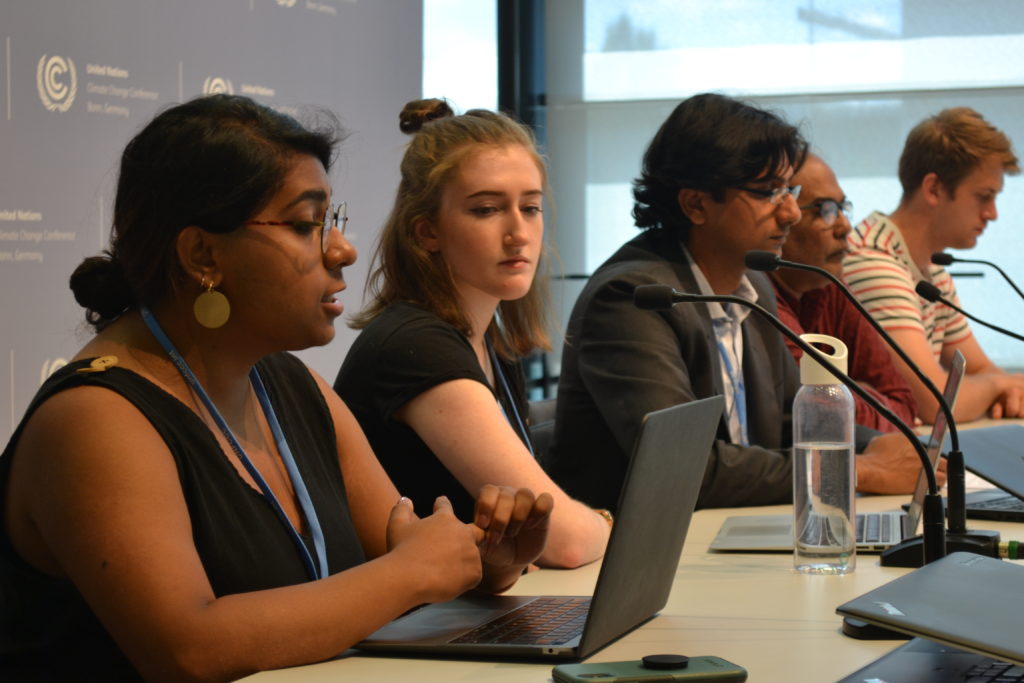
Aneesa Khan (SustainUS) moderates a press conference on Big Polluters’ conflicting interests at the climate talks, featuring panelists Eilidh Robb (UK Youth Climate Coalition), Sriram Madhusoodanan (Corporate Accountability), Souparna Lahiri (Global Forest Coalition), and Michael Bloss, a newly elected member of European Parliament.
Big Polluters and their Global North allies like the U.S., EU, Australia, New Zealand, and Norway want to sweep the issue of the fossil fuel industry’s conflicting interests under the rug. But we, our partners, and people like you all over the world are making clear that we’re not going to let that happen. From December’s People’s Demands for Climate Justice to today’s actions, we’ve been building a steady drumbeat for a world where corporations answer to people, not the other way around. And the power of our movement is only growing!
We need you to be a part of it. If you haven’t yet, take our just-launched digital action: Add your name to the call to the EU, Australia, New Zealand, and Norway to side with people, not polluters.
Keep scrolling for a handful of other photos from today’s action, and if you’re active on social media, please amplify our posts on Facebook and Twitter.
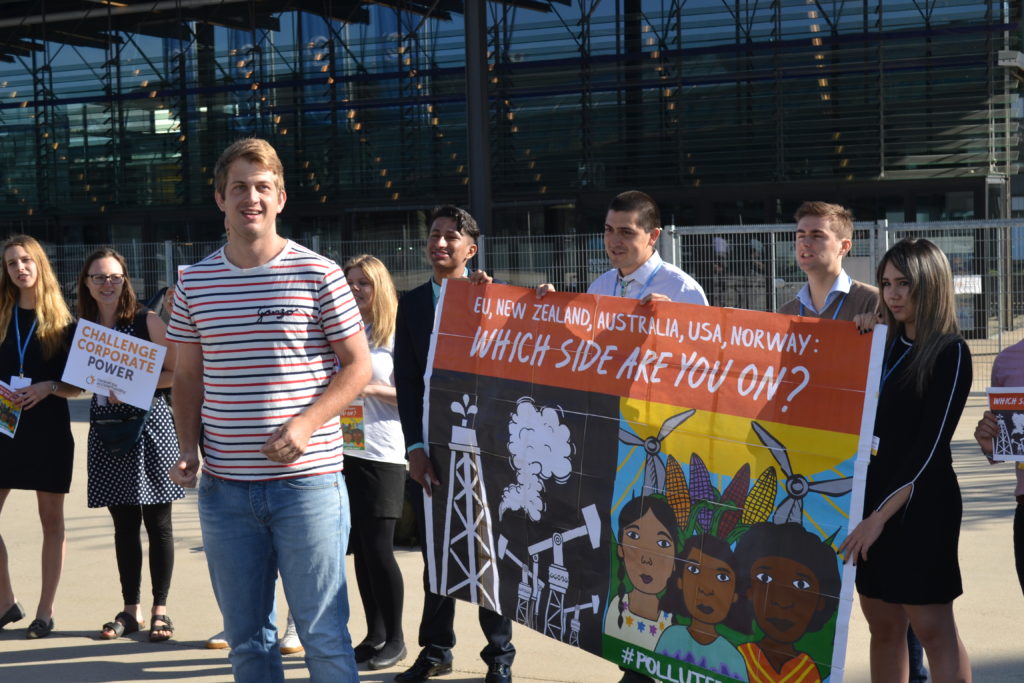
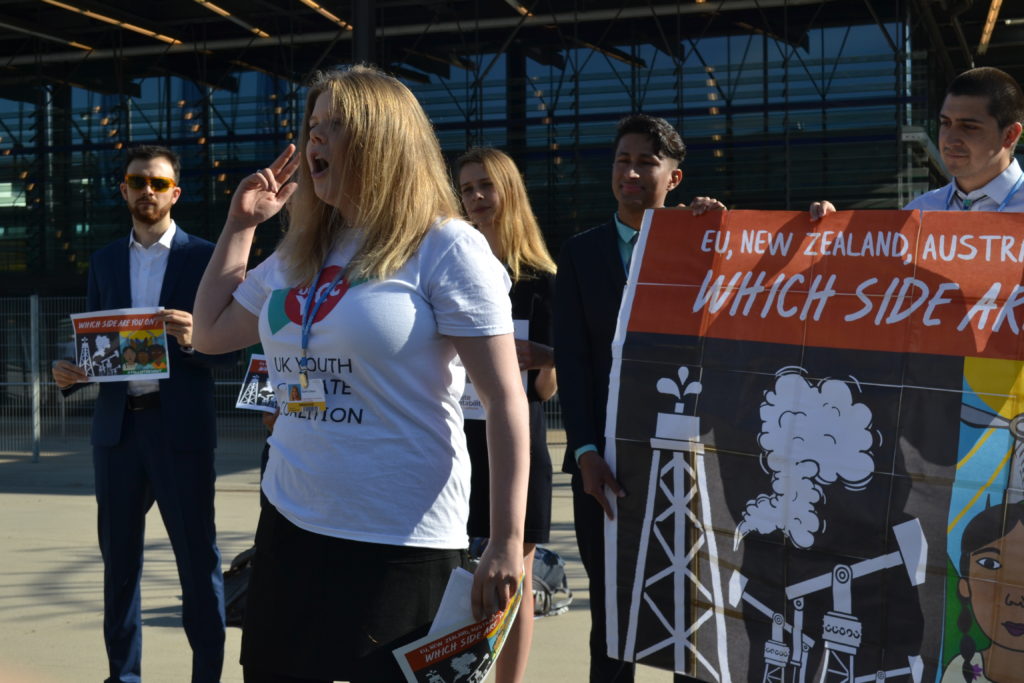
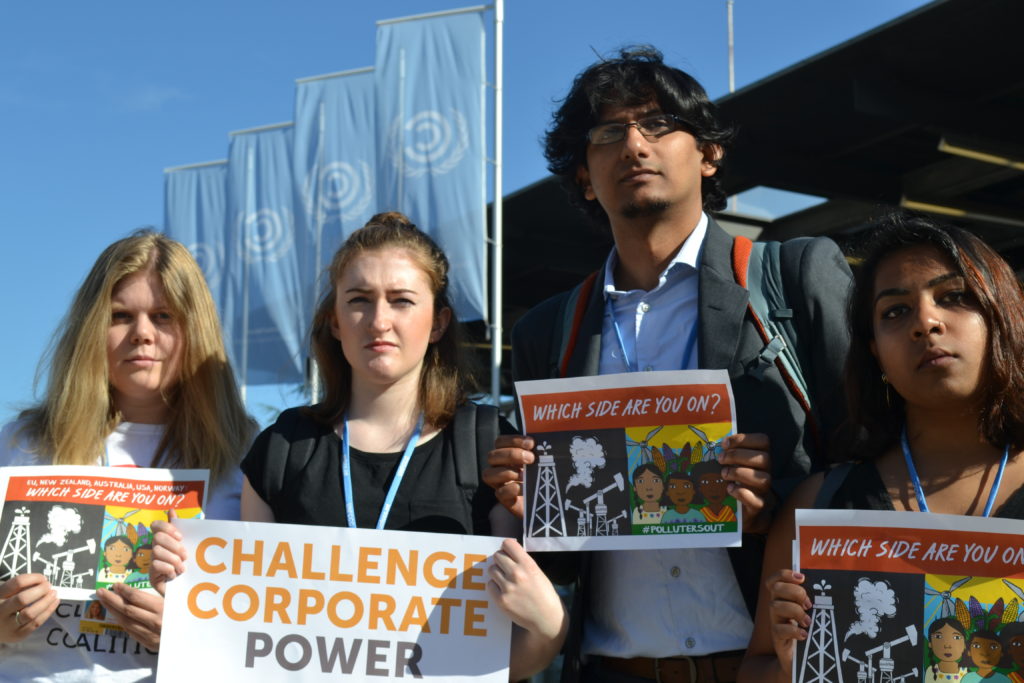
People around the world ask governments in Bonn: Which side are you on?
14 June, 2019
Today, youth-led organizations from around the globe led a social media action that reached more than 2 million people. People from all over the world took to Twitter with a single, unified message: The eyes of the world are on the U.N. climate talks in Germany—and specifically, on the Global North governments that shill on behalf of Big Polluters to block just climate policy.
TODAY: The world is watching the EU, US, Australia, Norway & New Zealand and demanding they choose people, not polluters at #SB50Bonn. We see you
! Join us by sharing why you want #PollutersOut of climate policy pic.twitter.com/IdyjmMPL2S
— Corporate Accountability (@StopCorpAbuse) June 14, 2019
These actions are critical to show these governments they can’t block climate justice behind closed doors. As the talks begin on Monday, the call to kick Big Polluters out will be front and center, and these governments will have to choose: people or polluters?
A huge shoutout to our allies at powerhouse youth-led and climate justice organizations like SustainUS (whose co-coordinator Aneesa Khan designed the beautiful graphic for the day), UK Youth Climate Coalition, ENGAJAMUNDO, and many more whose leadership helped make this action a huge success!
Just as importantly: It’s not too late to join in. Will you take action to demand governments kick Big Polluters out? Our toolkit has everything you need.
Scroll on for more posts from around the world….
Indigenous peoples’ human rights are time & again violated by the same gov’ts and extractive industries that are abusing power at the @UNFCCC. It’s time to get CEOs and #PollutersOut and people in #SB50Bonn
— Demand Climate Justice (@gcdcj) June 14, 2019
The fossil fuel industry is responsible for the climate crisis, so should not be able to interfere in solutions to it. EU, US, Norway, Aus & other developed govts sit in the pockets of Big Polluters while they obstruct #ClimateJustice. It’s time to kick #PollutersOut at #SB50Bonn pic.twitter.com/wDgOh8qqds
— 350 dot org (@350) June 14, 2019
In December me and my friends fought like hell to get #PollutersOut of the UNFCCC and quit polluting our politics!
It’s time for real and just solutions to the climate crisis, not polluter-backed propaganda. #SB50Bonn
pic.twitter.com/EGthSEu80K
— Eilidh Robb (@eilidhrobb03) June 14, 2019
Time to keep #PollutersOut! Fossil fuel corporations have undermined climate policy for too long! Next week during #SB50Bonn intersessional meeting of the UN climate treaty, we call governments to agree on creating a #conflictofinterest policy that protects climate policymaking
pic.twitter.com/E4VQo71x3M
— Greens in the EP (@GreensEP) June 14, 2019
Global North gov’ts need to keep fossil fuels in the ground, not invite the industry’s puppets to the table. Australia, US, EU, Norway, New Zealand: Choose people, not polluters at the UN climate talks. #SB50Bonn kick #PollutersOut pic.twitter.com/btVUbOG4up
— Labram Musah (@LabramM) June 14, 2019
.@EP_President, you don’t get to pose with @GretaThunberg and the European youth strikers one day, then turn a blind eye as the EU negotiates our climate alongisde the fossil fuel industry another… back people not polluters at #SB50Bonn #PollutersOut pic.twitter.com/s4Co5Gb3e9
— Pascoe Sabido (@pascoesabido) June 14, 2019
Raise your hand (or paw, or whatever you got) if you think it’s far past time to get #PolluersOut of the UN climate talks. #SB50Bonn#ClimateCatChat pic.twitter.com/IkJvbKLgoa
— Beverly Harp (@beverly_harp) June 14, 2019
If our feline friends can challenge Big Polluters and the Global North governments doing their bidding… you can, too!
Bonn Climate Change Conference 2019: What to watch for
13 June, 2019
The annual U.N. climate treaty meetings in Bonn, Germany, are here, and make no mistake: Though they tend to keep a low profile in the media, these meetings are the real deal. Here, every year, climate policy is developed and negotiated that affects millions of people’s lives.
The world’s most polluting corporations know how important these meetings are. That’s why they and their proxies show up with legions of lobbyists, pulling out all the stops to block, weaken, and delay the truly just, transformative climate solutions that might disrupt their status quo.
And it’s why Corporate Accountability and our allies from around the world show up, too: to challenge Big Polluters and the Global North governments doing their bidding, and amplify your voice demanding swift, urgent, just action to address the climate crisis.
Here are two key things to keep an eye on in the lead-up to and during the talks, which begin this Monday, June 17.
1. The call to protect U.N. climate treaty negotiations from Big Polluters’ interference.
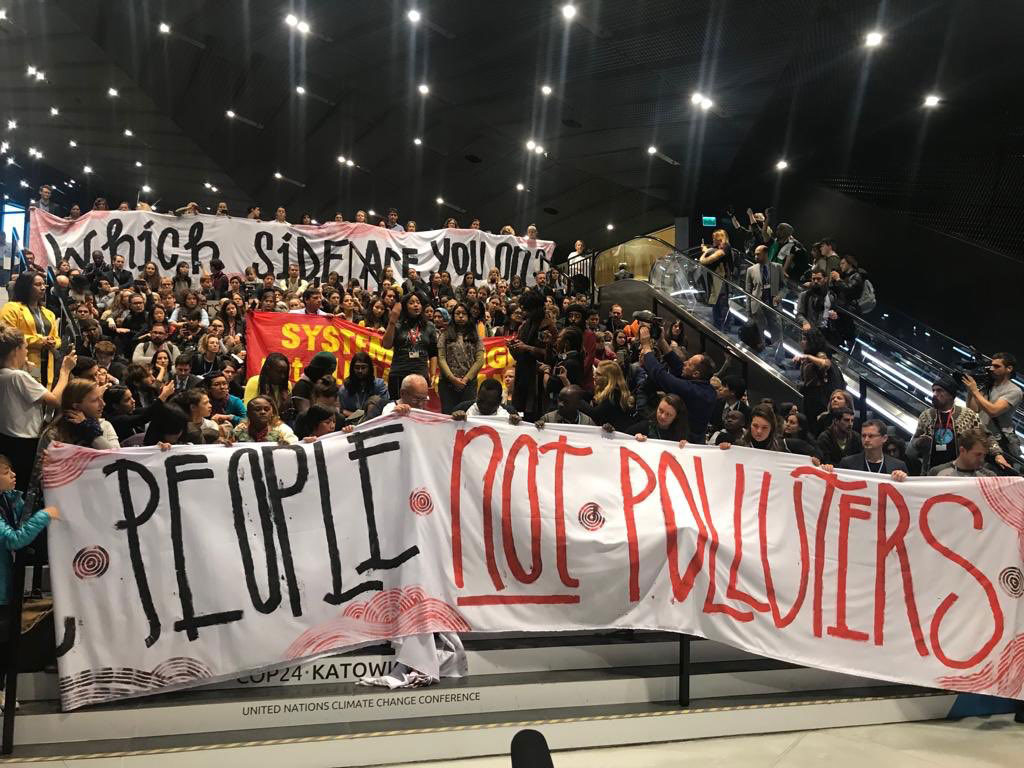
Hundreds of activists challenge governments to put people over polluters’ profits on the last day of the COP24 climate treaty negotiations in Poland in December 2018. The movement to kick Big Polluters out has grown mightier than ever.
What it is:
Four years ago, we and our allies launched our campaign calling to kick Big Polluters out of climate policy. Backed by hundreds of thousands of people like you around the world, government delegates from the Global South have been uniting to demand a conflict-of-interest policy that could protect the U.N. climate treaty from industry interference.
Powerful Global North governments, like the U.S. and EU, have consistently sided with Big Polluters to maintain the status quo—but polluting industries’ conflicting interests are back on the agenda this year, and the movement to kick Big Polluters out is stronger than ever.
Why it matters:
The U.N. climate treaty is a critical forum for international cooperation on the global scale that the global problem of the climate crisis requires. Yet since its inception more than two decades ago, it’s consistently failed to deliver the just solutions we need.
And it’s no secret why: The likes of Shell and Chevron roam the halls, lobbying delegates and hosting events to water down, delay, and obstruct meaningful climate policy—while every year, more and more people suffer the devastating impacts of a rapidly changing climate.
We know that clearing out the polluting elephant in the room is a long-overdue prerequisite to advancing meaningful safeguards for people and the planet.
What to watch for:
All eyes are on the conflicts-of-interest conversation this year. But we’re not just waiting to see what happens; we’re mobilizing. Stay tuned and check back here for ways you can take action to support the team on the ground in organizing to kick Big Polluters out!
2. Real solutions for climate justice vs. industry-driven schemes.

For years, Big Polluters and their proxies like the International Emissions Trading Association (IETA) have pushed hard to advance industry-driven schemes like carbon markets over true, just solutions to address the climate crisis.
What it is:
This is about to get wonky—but just for a minute, so stick with us: One section of the Paris Agreement, called Article 6, is supposed to lay out ways governments can collaborate to address the climate crisis.
At these talks, delegates will be hammering out exactly what that means (by developing what are formally called “guidelines for Article 6”).
Why it matters:
Big Polluters and their proxies have a twisted view of what international cooperation looks like—namely, they only want measures that allow them to keep extracting, burning, and profiting from fossil fuels. So they’re pushing to make the Article 6 guidelines focus exclusively on market-based schemes—which have failed time and again to reduce carbon emissions, but do maintain the status quo.
Meanwhile, the climate justice community has laid out a vision for international cooperation that will meaningfully and justly address the climate crisis: things like sharing renewable energy technology, harnessing agroecological practices, and transferring knowledge and funding. (Read more in the People’s Demands for Climate Justice.)
What to watch for:
This is the one part of the Paris Agreement guidelines that has yet to be finalized, so you can expect it to be front and center. Again, you can be sure a handful of Global North governments will shill on behalf of Big Polluters—while justice-oriented Global South governments already bearing the brunt of the climate crisis, backed by people across the climate justice movement, demand real solutions and collaboration. Stay tuned for ways you can join in solidarity on the side of climate justice.
Over the next two weeks, check back here for updates on these and other key developments at the climate talks.
And stay tuned here and on our social media channels (Facebook, Twitter, LinkedIn, and Instagram) for ways that you can join in solidarity with our team on the ground and the global climate justice movement to challenge Big Polluters and advance just climate solutions.







